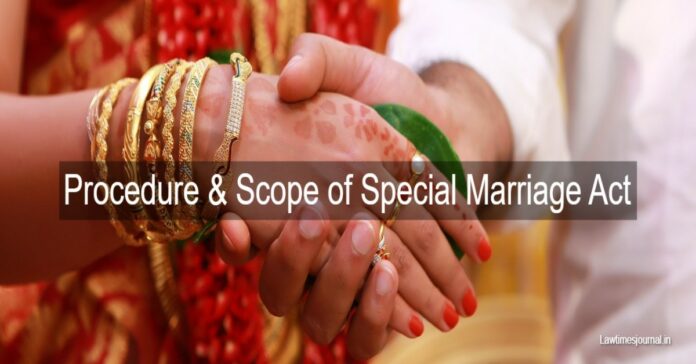
Introduction
The Special Marriage Act, 1954 concerns inter-caste & inter-religion marriages. It is a marriage between a boy & a girl of two different caste/religions. In Older times, boys or girls used to marry wherever their parents decided. But now time is changed. Now the youth have their own choice and preferences. Now marriage happens with someone who is more compatible with them compared to do marriage with someone who belongs to their caste or religion. Now, caste & religion is not a matter of utmost consideration.
This Act is enacted to provide for a unique form of marriage by registration. The parties don’t have to renounce their religion.
Requirements
- As we may know there are many different kinds of rituals, customs, and ceremonies, etc., in proper Indian Marriages. But none of them is required if anyone is marrying through the Special Marriage Act as it is a civil contract.
- The basic need for a valid marriage is the consent of both boys & girls to the marriage. If both boys & girls are willing to marry each other, that’s sufficient; caste, religion, etc. can’t act as a barrier to their marriage here.
- The parties must file a notice to the district’s Marriage Registrar stating their consent & willingness to marry each other in which at least one of the parties to the marriage has lived for at least 30 days prior to the date on which such notice is filed. After the expiry of 30 days from the date that such notice was published, the marriage is then said to be solemnized.
- But if anyone concerned with the parties has objections to the marriage and the registrar finds that as a genuine problem, then the registrar can cancel the marriage.
- There is also a need for Three Witnesses for the marriage.
- Marriage is not binding on the parties unless each party states “I, (A), take thee (B), to be my lawful wife (or husband),” in the presence of the Marriage Officer and three witnesses.
Conditions for Marriage
- At the time of marriage, the Boy & Girl must attain the age of 21 years & 18 years respectively. This is the minimum age respectively for a boy & girl to marry.
- They must be unmarried and also shouldn’t have any living spouse at the time of marriage.
- The boy & girl can’t be insane (mentally ill). They should be mentally fit, at the time of marriage.
- They should not be subjected to prohibited relationships. They shouldn’t be in blood relationships. Otherwise, it acts as a ground for the dissolving of a marriage. Like in Muslim marriages you can marry your cousin sister or brother but it doesn’t apply in Hindu marriages.
- Registration of Marriage
Marriages are registered by 2 types
1. By Personal laws (like Hindu or Muslim marriage act),
2. Special Marriage Act,1954.
There is a step-by-step process to apply in India for a Special Marriage Act.
Step-1: Eligibility Check
Both the parties must be citizens of India. Neither of the parties must have a living spouse, at the time of the marriage. If earlier there is marriage, then it should be dissolved. Boy & Girl have to grant free and full consent to the marriage. The intending parties shall adhere to the age limit laid down in this Act i.e., 21 years & 18 years of age for boys & girls respectively. The marriage can’t happen if the boy & girl fall within the category of a prohibited relationship as per their respective religious customs.
Step-2: Reach out to the concerned Marriage Officer
Boy or Girl should have a permanent residence (must live there for at least 30 days prior to the notice being submitted) in that district jurisdiction. To apply, reach the chosen district marriage officer.
Step-3: Public Notice and Objections
When an application is received by the District Marriage Officer, duly signed by both the parties, the officer will then issue a third-day public notice, if anyone has any objections to the marriage.
The objections generally referred if the conditions that are mention in Section 4 of the Act (also referred to in Step 1) are not properly followed.
If no objections are raised & all the conditions are properly followed, a marriage certificate should be entered in the marriage certificate book. Both boy & girl & their respective witnesses are required to sign. (There should be 3 witnesses present on the day of marriage).
There is also a need of certain documents that are as follows: –
1. Proof of Age,
2. Address Proof,
3. Affidavit with regard to Marital Status,
4. Proof that Parties are not in a degree of Prohibited Relationship.
5. Passport size Photos.
Scope of the Act
In older times, it’s a tradition that only marriage where your parents decided your marriage. It doesn’t matter at all that did parents ask about your choice, your point of view. If they fixed your marriage somewhere then you have to marry there itself. But now the time has changed, now the younger generation chooses their life partners on the basis of their compatibility & choices & not on the basis of caste, religion, etc. It is right also, as it is them who are going to spent & share their whole life with each other so they should also know about their partners. Love is a very beautiful emotion & it should not be weighed on the basis of caste or religion.
Thus, the Special Marriage Act is formed to provide for a special form of marriage, where the parties to the marriage do not have to renounce their religion.
References
- https://www.drishtiias.com/current-affairs-news-analysis-editorials/news-editorials/16-11-2020/print
- https://blog.ipleaders.in/special-marriage-act/
- https://tripakshalitigation.com/special-marriage-act-a-legal-lacunae-for-prenuptial-agreement/
- https://www.facebook.com/195361307260015/posts/-special-marriage-act-1954support-wame918779696580the-special-marriage-act-is-us/3380585178737596/





